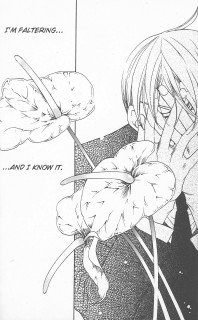 Creator: Setona Mizushiro
Creator: Setona Mizushiro
U.S. publisher: Go! Comi
ISBN: 9781933617244
Released: April 2007
Original release: 2005
After School Nightmare is a ten-volume manga series created by Setona Mizushiro which has prominent psychological elements and an unsettling atmosphere. The series is currently out-of-print in English, but fortunately most of the volumes are still relatively easy to find. I initially read the first few volumes of After School Nightmare after borrowing them from my local library and made a point to collect the entire series based on the impression left on me by the early part of the manga alone. However, I never actually read any further than the third volume, in part because I found the series to be so effectively disconcerting (which I don’t necessarily consider to be a bad thing, especially for what could be considered a horror manga) and because some of the themes in the series are pretty hard-hitting and true-to-life, even if they are explored in a fantastic way. After School Nightmare, Volume 3 was originally published in Japan in 2005. The sadly now defunct Go! Comi released the English-language edition of the volume in 2007.
Every Thursday, Mashiro and a small group of other students attend a special class after school required for their graduation. In it they enter one another’s dreams, taking on forms representative of their true selves and forced to face the darkness that resides in their hearts. Many of these forms are so unlike the students’ appearances in their waking lives that it’s often impossible to know for certain who is who. At least that was true before Itsuki Shinonome joined the class. The youngest student at the school and a genius with an incredible intellect, he is prepared to leverage that privileged information in any way that he can in order to leave high school behind as quickly as possible. Knowing that Mashiro is desperate to uncover the identity of the student who takes on the form of the Black Knight in the dreams, Itsuki makes him a deal. In return for Mashiro helping and protecting him, as well as closely following his orders, Itsuki will reveal the name of the student who is the Black Knight, but only after he is able to complete the class.
 Over the last few volumes of After School Nightmare Mashiro has become increasingly obsessed with the identity of the Black Knight, and with good reason. He was assaulted by the Black Knight within the dreams and suspects that the knight may be the same person as Sou, another student who has been very forceful about his feelings for Mashiro. Mashiro wants to confirm whether or not his suspicion is correct, but he hasn’t really completely thought through what he will do with that information once he knows the truth or fully considered exactly how having that knowledge will change him. Already Mashiro finds himself thinking more and more about Sou—the thin line between hate and love becoming blurred to an even greater extent—and this has had major impacts on Mashiro’s other relationships, particularly on the one with his girlfriend Kureha. Something that Mizushiro has done especially well in After School Nightmare is capture the complexities and turmoil of interpersonal relationships and how they affect one another.
Over the last few volumes of After School Nightmare Mashiro has become increasingly obsessed with the identity of the Black Knight, and with good reason. He was assaulted by the Black Knight within the dreams and suspects that the knight may be the same person as Sou, another student who has been very forceful about his feelings for Mashiro. Mashiro wants to confirm whether or not his suspicion is correct, but he hasn’t really completely thought through what he will do with that information once he knows the truth or fully considered exactly how having that knowledge will change him. Already Mashiro finds himself thinking more and more about Sou—the thin line between hate and love becoming blurred to an even greater extent—and this has had major impacts on Mashiro’s other relationships, particularly on the one with his girlfriend Kureha. Something that Mizushiro has done especially well in After School Nightmare is capture the complexities and turmoil of interpersonal relationships and how they affect one another.
Through the genre of dark, psychological fantasy, After School Nightmare touches upon issues related to identity, gender, and sexuality. Although all three can be closely intertwined, gender specifically is frequently at the forefront of Mashiro’s mind since his body has both male and female characteristics. He is so concerned about being seen as a man by others that he immediately rejects anything feminine about himself, blaming that side of him for all of his weaknesses instead of taking full responsibility for his actions and feelings. But as Itsuki points out, girls have to deal with plenty of challenges and unfair situations every day of their lives; simply existing within society requires and demands incredible strength from them. Mashiro’s attitude towards gender roles in the first two volumes of After School Nightmare was very traditional, so I’m glad to see his rigid assumptions and beliefs being shaken up a bit. Of course, this will force him to completely reevaluate who he is as a person, which will be a difficult and perhaps even traumatic process, especially as he was already struggling with establishing and accepting his own identity.

Speak Your Mind